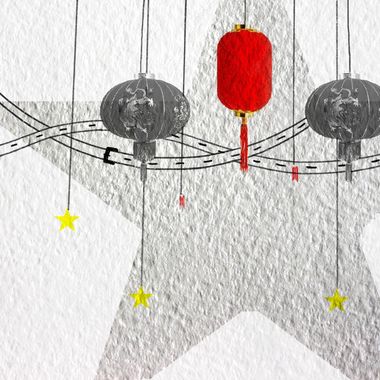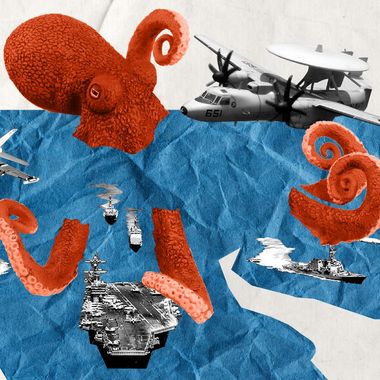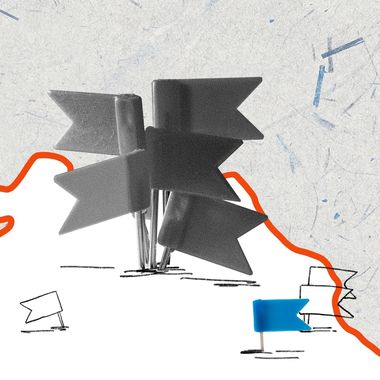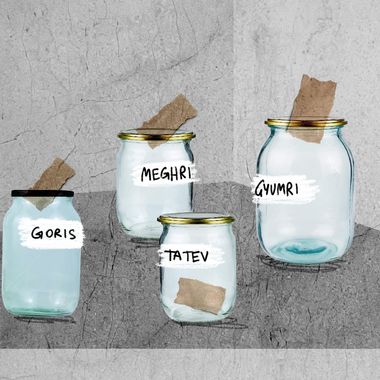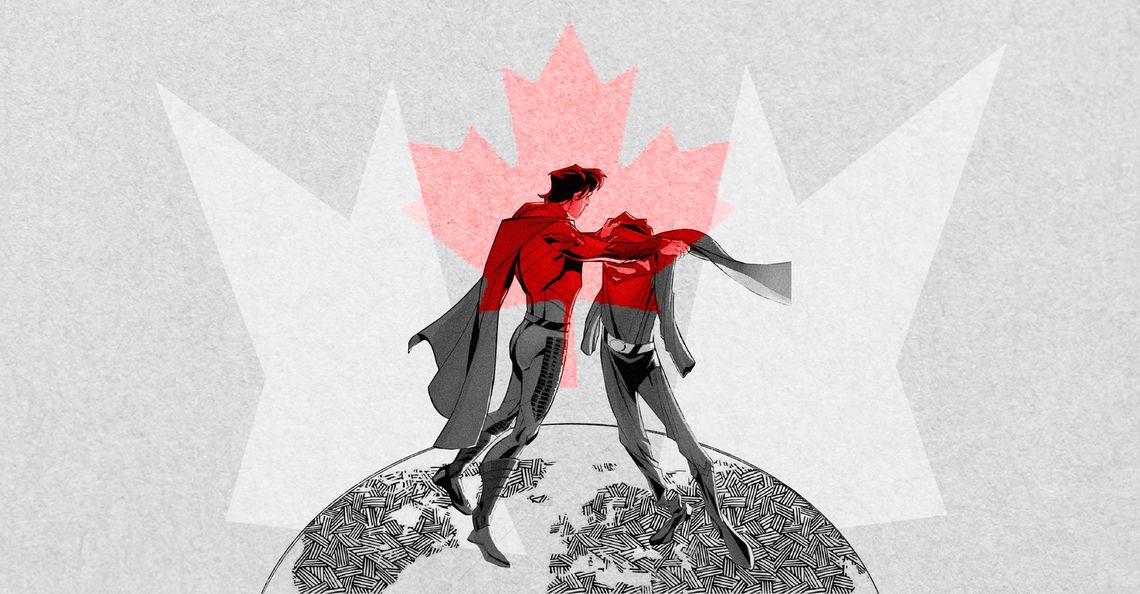
Illustration by Armine Shahbazyan.
On September 20, 2021, Justin Trudeau will face his third election as Leader of the Liberal Party of Canada. As the first results start coming in that night, it will be the 30th anniversary of Armenia’s independence in Yerevan, which is eight hours ahead of Ottawa. While such a milestone should be a joyous occasion, the shadow of the 2020 Artsakh War will make it hard to celebrate. And Trudeau’s government is part of the reason why.
Canada has a finely-crafted international image as a champion of human rights and the “rules-based international order". It is near the top of Transparency International’s Corruption Perception Index—though it has slipped a few points since Trudeau took office in 2015. It is one of those countries that Armenians have in mind when they talk about how great things are in “developed countries”. While it’s true that giving a bribe in Canada won’t get your passport renewed any quicker (there’s an institutionalized rush fee for that), it is important to acknowledge that political corruption still goes on at the highest levels.
Trudeau himself has been implicated in a surprisingly long list of scandals in his six years as Prime Minister. There was the time he asked the Aga Khan to let his family and friends use his private island for a Christmas vacation, while the Aga Khan Foundation was a registered lobbyist that received millions in federal grants. When the Ethics Commissioner found that Trudeau had contravened the Conflict of Interest Act… nothing happened. He apologized and said it wouldn’t happen again.
But it did. Trudeau made a big deal about appointing a gender-balanced and ethnically-diverse cabinet. Unfortunately, he didn’t listen to their best advice when it mattered. In 2019, another Ethics Commissioner (the first one was replaced) found that Trudeau had contravened the Conflict of Interest Act again. This time, it was for pressuring his then-Justice Minister and Attorney-General Jodi Wilson-Raybould to forego criminal prosecution against Canadian engineering giant SNC Lavalin for—wait for it—bribing the Libyan Gaddafi regime. Instead, he wanted her to use a custom-made Get-Out-Of-Jail-Free card called a Deferred Prosecution Agreement (DPA) that his government had slipped into an omnibus budget bill just a couple months prior. (It wouldn’t actually be free; they would have to pay a sum to avoid criminal prosecution for bribery, which is sadly ironic.) Wilson-Raybould was shuffled out of her position after not complying, and later kicked out of the Liberal Party when the episode eventually became public. A member of the Wewaikai First Nation in British Columbia, she just released her book, entitled “Indian in the Cabinet: Speaking Truth to Power”.[1]
There have been other Trudeau scandals as well, including a billion-dollar sole-source contract to the WE Charity, which had paid his family members enormous speaking fees and put on huge shows to present himself and his family as rock stars to school students. Then there was the time that he apologized for groping a female reporter by saying “If I had known you were reporting for a national paper, I never would have been so forward.” Though the latter did not have a direct financial aspect, it highlights his sense of entitlement and impunity, that even after he is caught and exposed, no real consequences will follow.
In 2001, while he was a teacher at a British Columbia private school, Trudeau dressed in blackface for a charity gala with an Arabian Nights theme. The release of a picture taken that evening of him holding a woman colleague became a central topic of the 2019 election campaign. The Telegraph identified the woman in question as Vancouver-born Armenian folk singer Mariam Matossian, who was also a teacher at the time.
Oops… Sorry
“The people of Azerbaijan have repeatedly heard from mediators and leaders of some international organizations that there is no military solution to this conflict. I said that I do not agree with this thesis, and I was right,” Azerbaijani President Ilham Aliyev crowed on November 9, 2020, after signing the trilateral ceasefire agreement that ended the war he started. A military stalemate had kept the Nagorno-Karabakh conflict in the negotiation stage since 1994. Trudeau was one of those international voices saying that there was no military solution to the conflict, but his government became instrumental in breaking that stalemate and allowing a dictator to unleash war against an indigenous minority on September 27, 2020 with next-generation weapons.
Of course, a number of different factors contributed to the start and the outcome of the 2020 Artsakh War. One of them was the introduction of state-of-the-art drones. Turkish Bayraktar drones used against Artsakh were heavily reliant on target acquisition optics made by L3Harris WESCAM in Burlington, Ontario, a short drive west of Toronto. To say that any Canadian official knowingly intended for this game-changing military equipment to get into Azerbaijan’s hands specifically would be false. A September 2020 report by Project Ploughshares outlines how it happened:
In October 2019, Canada joined Germany, France, and the United Kingdom in an arms embargo against Turkey in response to Turkey’s unilateral invasion of [the Kurdish-populated region of] Syria, which GAC [Global Affairs Canada, which houses the Ministry of Foreign Affairs] deemed could risk “undermining the stability of an already fragile region, exacerbating the humanitarian situation and rolling back progress achieved by the Global Coalition Against [ISIS].”
In April 2020, the Canadian arms embargo was indefinitely extended. The principled and proactive freeze on Turkish-bound exports was seen as a positive example of Canada’s arms-control regime working as it should. In response, Turkish officials frantically pressured Ottawa to allow an exemption, explicitly for WESCAM sensors, which have become essential to the operation of its UAVs. Turkey’s President Recep Tayyip Erdogan personally called Prime Minister Justin Trudeau [on April 24, 2020] to request that the export freeze be reversed, emphasizing the “utmost importance to the import of the optics and surveillance systems from the Canadian firm WESCAM for its military drones,” which were being used in Syria and Libya.
[In June 2020], media reports indicated that GAC had granted a special exemption for WESCAM products, despite the continuing embargo against Turkey. The Canadian government has yet to offer a reason for the decision.
Very early during the 2020 Artsakh War, it became evident that the Canadian-made equipment was being used to bomb Armenians. It took a week for these specific export permits to be suspended on October 5, while the war was raging on. It was not until April 2021 (conspicuously ahead of April 24 commemoration events being held in various Canadian-Armenian communities) that the permits were actually canceled, lifting concerns that the shipments might be restarted. But the damage was already done. Bunker after bunker, tank after tank, had been bombed using the drones, clearing the way for the Azerbaijani advance.
There is no evidence that Trudeau personally, nor any other Canadian official received a kickback for approving the export permits—though WESCAM certainly made a tidy profit—but there has been no investigation into the matter, either. As required by the Arms Trade Treaty (ATT), Canada had assessed that the export of the equipment to Turkey could “undermine peace and security,” which indeed turned out to be correct. The bureaucracy worked as it should; it was only after political interference that Canada’s commitments to global peace were flouted. In the absence of a public report, a casual observer can be led to believe that the phone call referred to in the Project Ploughshares report between Erdogan and Trudeau is the reason why.
Canadians, and Trudeau personally, are famous for apologizing profusely, but there has been no apology yet on this matter.
Wasted Potential
Justin Trudeau has visited Armenia twice, most recently at the 2018 La Francophonie Summit in Yerevan. Given the context of that year, during his trip, he launched the Arnold Chan Initiative for Democracy in Armenia, which provided $76,000 USD ($99,000 CAD) to five different NGOs. The initiative was a one-time local renaming of the Canada Fund for Local Initiatives (CFLI) that is run by Canadian embassies throughout the world. The name honored a former Liberal MP from the riding of Scarborough-Agincourt (where there is a significant Armenian community) in Toronto that had passed away from cancer the previous year. However, the program did not keep the name for its 2021 call for proposals.
While the first visit by a sitting Prime Minister to Armenia was a historic baby step, prospects that the Canadian foreign affairs establishment would reverse its antagonistic stance against Armenia have been dashed. For decades, Canada’s foreign affairs policy toward the Armenian Genocide had been one of official censorship and denial. Even after the Canadian Senate passed a motion recognizing the Armenian Genocide in 2002, and the House of Commons in 2004, under the administrations of Liberal Prime Ministers Jean Chretien and Paul Martin, the government still dragged its feet saying that the motions did not reflect the government’s continuing official policy. It was not until Conservative Stephen Harper became Prime Minister in 2006 that the federal government began to use the word genocide in its annual commemoration statements. To his credit, Justin Trudeau maintained his predecessor’s approach, and denial of the Armenian Genocide in Canada is now limited to fringe groups associated with the Turkish Embassy there.
However, words are supposed to have meaning. The purpose of recognizing genocide is to prevent it from happening again. Any propaganda about Canada standing up for human rights falls flat in the face of its present attitude toward Armenia and Armenians.
On April 1, 2020, weeks before the call between Erdogan and Trudeau, and half a year before Canadian arms helped unravel the peace in the South Caucasus, the Twitter account of the Canadian Embassy in Turkey, which is also responsible for Azerbaijan, tweeted:
[Canada] supports the territorial integrity #Azerbaijan and doesn’t recognize the so-called “elections” held in Nagorno-Karabakh on 31/3. Such “elections” undermine efforts, incl by the OSCE #MinskGroup, to achieve a peaceful settlement of the NK conflict. #CanadainAzerbaijan @CanadaOSCE
The Republic of Artsakh had just held the most competitive election in its history the day before. The previous summer, they had enacted an electoral reform bill that implemented full proportional representation (an issue that continues to destabilize politics in Georgia), strengthened the gender quota for parties’ candidate lists, and committed to posting signed voter lists publicly at polling stations after the election for public scrutiny. Many of the polling stations, where Internet connectivity allowed, were livestreamed on Election Day for any who wanted to follow the process. Artsakh was setting an example of democratic best practices that would be welcomed by activists not only in Azerbaijan, but in Canada as well.
In contrast, the Azerbaijani government had just held its parliamentary election in February 2020. The government diverged from the established election schedule to set the date to provide an unfair advantage (just as Justin Trudeau did in calling the early 2021 Canadian federal election). It used the first-past-the-post system that disadvantages opposition parties (just as Canada does). But, most importantly, the results were fabricated through ballot box stuffing, intimidation and falsification of documents. Berlin-based Azerbaijani analyst Altay Goyushev even decried the election by saying, “The Azerbaijani government has lost the moral voice to call Nagorno-Karabakh part of Azerbaijan. Nobody in the international community will look favorably at the idea that the Armenians of Karabakh should accept the yoke of authoritarian and corrupt Azerbaijan.”
Yet, Canada’s response was that Artsakh’s elections were the impediment to a peaceful settlement? The Armenian-Canadian community protested the statement, led by the Armenian National Committee of Canada. No formal retraction has ever been given; the tweet has not been deleted.
Canada is the only G7 country not to have an embassy in Armenia. Under Trudeau’s administration, even the Honorary Consul’s office in Yerevan was closed. Just three years after the La Francophonie summit, relations between the two countries are more distant than ever.
Canada has been undergoing a reckoning with its past, sparked when bodies were found at the sites of former residential schools, where indigenous children were taken after being forcibly separated from their parents. The purpose of these institutions was to “kill the Indian in the child.” Genocide denied is genocide repeated. If Canada’s warped electoral system allows Justin Trudeau to stay in power, especially if it grants him the majority government he seeks with less than 50% support from voters, he needs to make real change in lifting the culture of impunity. Sorrys won’t bring back the dead.
Or maybe he doesn’t need to. The alternate lesson is that flouting democracy, unpunished political corruption and profiting off arms sales to dictators is the way the game is played, as long as you can maintain some believable virtue-signalling in front of the cameras.
------------------
[1] The title plays on the children’s novel “The Indian in the Cupboard”, which was later made into a movie.
Also read
Was China All Innocent During the 2020 Artsakh War?
By Paruyr Abrahamyan
China considers Turkey a key strategic partner under the Belt and Road Initiative. It has also intensified economic relations with Azerbaijan and is keen to diversify its commercial routes to Europe. Was China a silent observer or did it have any role to play during the 2020 Artsakh War.
Armenia in the Biden Era
By Artin DerSimonian
With Russia and now Turkey having new footholds in the South Caucasus following the 2020 Artsakh War, will Washington under the Biden administration attempt to counter these new developments?
The Aliyev Regime’s Frustration and Hubris
By Nerses Kopalyan
The Aliyev regime is profoundly frustrated, writes Nerses Kopalyan, however, this frustration is an inherent byproduct of Baku’s illusions of grandeur and the awkward hubris that has consumed Ilham Aliyev.
Turkey’s “Blue Homeland”
By Anna Barseghyan
By extending its expansionism from land to sea, straining regional relationships and traditional alliances, Turkey is testing its limits and can expect to find itself in deeper conflicts when it finally reaches them.
Armenia’s Role and Place in the Geopolitical Environment of the South Caucasus
By Areg Petrosyan
Following the 2020 Artsakh War, the creation of a new geopolitical reality in the region by Baku and Ankara opened a "Pandora's Box" forcing the main stakeholders to re-articulate their geopolitical agenda.
Also by the author
2021 Municipal Elections in Gyumri and Other Cities
By Harout Manougian
Municipal elections will take place in Armenia throughout the fall and serve as an important indicator for the future direction of Armenian politics. Harout Manougian breaks it down.
A People’s Constitution Must Be Framed by the People
By Harout Manougian
July 5 marks Constitution Day in Armenia. Constitutional reform is still on the mind of the re-elected Prime Minister, whose approach to forming a constitutional package has so far greatly resembled that of his predecessors. But there are more participatory models that could be adopted.
Comments
Ari Sardarian
9/18/2021, 11:43:27 PMBlame as many foreign leaders as you wish, that’s your right! But only the corrupt Soviet Era Armenian political leaders and generals must be blamed. By now only only Artsakh should have been incorporated into Fatherland but also we should have taken back Nakhichevan.


